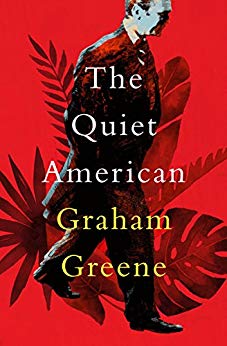The Quiet American, by Graham Greene
Jul 29
2019

It's been nearly twenty years since I read Graham Greene's The Quiet American, but a flurry of recent mentions in the news convinced me that it was time to revisit it. I'm still not familiar with the First Indochina War (which I've been meaning to learn more about since, uh, high school), so I can't weigh in on the accuracy of Graham's war descriptions, but I feel confident in my assessment of his two main male characters: they are both 100% awful.
The Quiet American is told from the point of view of Fowler, a middle-aged English war correspondent with an opium addiction and a very, very young Vietnamese mistress, Phuong. When a young American agent named Pyle blows into Saigon, Fowler is initially inclined to shrug him off as a high-minded but ineffectual dreamer—but Pyle's uninformed enthusiasm does not prevent him from taking action, and it isn't long before Fowler decides to intervene. His motives are suspect, however, and become even more so when Pyle manages to entice Phuong away from him.
Look, I'm going to leave it to people with a better understanding of Vietnamese history and politics to evaluate Graham's depiction of this conflict. Given enough time and some hardcore Wikipedia-ing, I'm pretty sure I could write a long essay about Phuong as a metaphor for the country itself, or the duality between Fowler and Pyle as depictions of mirroring neo-colonialist impulses. I don't have the time or energy for that, however, so I'm sticking to what I know: analyzing the book in front of me, which I've decided is a horror story. Seriously, both Fowler and Pyle are monstrous creations, solely invested in their own myopic world views. As the story is narrated by Fowler, we are subjected to his occasional musing on his own biases and obliviousness. I'm not sure if Graham wanted us to give the character some credit for self-awareness, but I certainly didn't—you only get a participation trophy if you actually try to act like a human being, dude. Pyle's awfulness has far-reaching consequences (he's like a huge, city-destroying baby), but he's only seen at a remove, which means we are spared his innermost thoughts (which I suspect consist mostly of “Phuong is pretty! U-S-A! U-S-A! I'm gonna build a bomb.”). It is a testament to Graham's incredible skill as a writer—and the fact that the book is pretty short—that I managed to get over my disgust with his characters and finish the story at all.
The Quiet American is told from the point of view of Fowler, a middle-aged English war correspondent with an opium addiction and a very, very young Vietnamese mistress, Phuong. When a young American agent named Pyle blows into Saigon, Fowler is initially inclined to shrug him off as a high-minded but ineffectual dreamer—but Pyle's uninformed enthusiasm does not prevent him from taking action, and it isn't long before Fowler decides to intervene. His motives are suspect, however, and become even more so when Pyle manages to entice Phuong away from him.
Look, I'm going to leave it to people with a better understanding of Vietnamese history and politics to evaluate Graham's depiction of this conflict. Given enough time and some hardcore Wikipedia-ing, I'm pretty sure I could write a long essay about Phuong as a metaphor for the country itself, or the duality between Fowler and Pyle as depictions of mirroring neo-colonialist impulses. I don't have the time or energy for that, however, so I'm sticking to what I know: analyzing the book in front of me, which I've decided is a horror story. Seriously, both Fowler and Pyle are monstrous creations, solely invested in their own myopic world views. As the story is narrated by Fowler, we are subjected to his occasional musing on his own biases and obliviousness. I'm not sure if Graham wanted us to give the character some credit for self-awareness, but I certainly didn't—you only get a participation trophy if you actually try to act like a human being, dude. Pyle's awfulness has far-reaching consequences (he's like a huge, city-destroying baby), but he's only seen at a remove, which means we are spared his innermost thoughts (which I suspect consist mostly of “Phuong is pretty! U-S-A! U-S-A! I'm gonna build a bomb.”). It is a testament to Graham's incredible skill as a writer—and the fact that the book is pretty short—that I managed to get over my disgust with his characters and finish the story at all.
Posted by: Julianka
No new comments are allowed on this post.
Comments
No comments yet. Be the first!